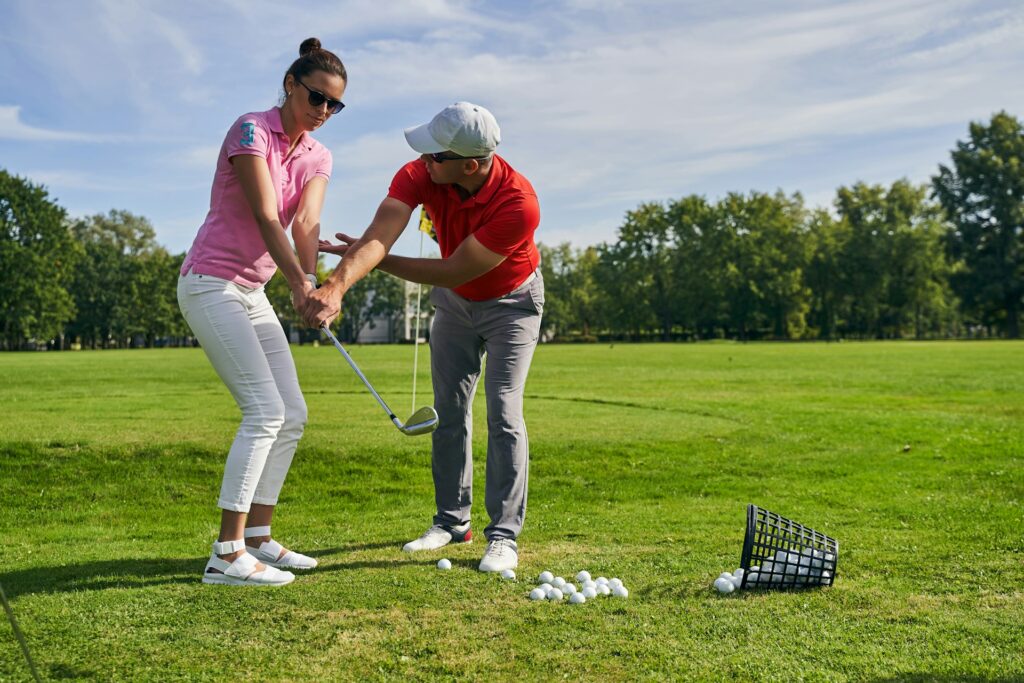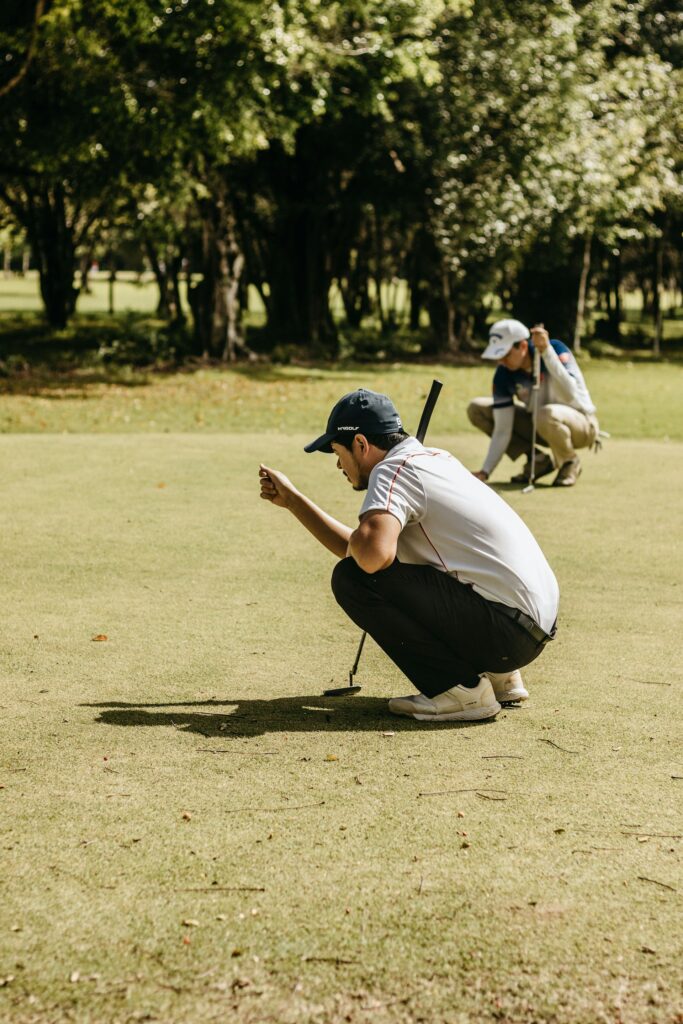
Best Golf Tips for Beginners: Finding the Perfect
Golf can be a fun and challenging sport for both beginners and experienced players. If you’re new to golf, there are a few things you need to know in order to make the most of your experience. Here are some of the best golf tips for beginners to help you get started.
This list of the best golf tips for beginners will highlight the top tips for new golfers that are just starting out on the greens and need some help. With this list, you’ll be able to get started with your golf game and improve quickly.
A few other lists that you might benefit from after reading through this list of the best golf beginner tips are our lists of the best golf books, best golf instruction books, and best golf movies. With these lists, you can find even more great golfing information.
Top 20 Golf Tips for Beginners:
1. Learn the Basics of the Golf Swing
Understanding the mechanics of a proper golf swing is crucial. Focus on grip, stance, posture, and alignment before worrying about power. Practicing your swing consistently will help you build muscle memory and avoid bad habits. A few lessons from a golf pro can also go a long way in helping you start strong. Keep it simple and repeatable as you build your confidence.

2. Don’t Neglect Short Game Practice
While it’s tempting to focus on driving distance, beginners often gain strokes on the course with putting and chipping. Practicing your short game will lead to lower scores faster than anything else. Spend time on the putting green and practice different chip shots. Learning touch and feel around the greens builds overall confidence in your game.
3. Get Fitted for Clubs
Using clubs that are the right size and type for your body can drastically improve your performance and reduce frustration. A professional club fitting ensures that shaft length, flex, grip, and lie angle all match your swing. Even as a beginner, properly fitted clubs make learning easier and more enjoyable. Many golf shops offer free fittings with a club purchase.
4. Start on the Driving Range
Before jumping into full rounds, get comfortable by practicing at the driving range. Work on your fundamentals and try different clubs to learn what works for you. Ranges are also great for warm-ups before a round and for experimenting with swing changes. Focus on control and consistency rather than distance in the beginning.
5. Learn the Rules and Etiquette
Golf has its own set of rules and traditions. Understanding basic rules like out of bounds, penalty strokes, and how to take relief helps avoid confusion. Equally important is golf etiquette, such as being quiet during shots and repairing divots. Learning both will help you feel more confident on the course and respectful to fellow players.

6. Take Professional Lessons
Investing in a few lessons from a certified golf instructor can pay big dividends. A coach can help identify bad habits early and teach proper techniques. One-on-one lessons or group clinics are great options depending on your budget. Lessons also provide a structured approach to improvement rather than trial and error.
7. Don’t Obsess Over Score
In the early stages, your goal should be learning and enjoying the game, not shooting par. Avoid the frustration of bad shots by focusing on small wins—like a well-hit drive or a solid chip. As your skills grow, your scores will naturally improve. Celebrate progress and stay positive throughout your learning journey.
8. Warm Up Before Every Round
Warming up prevents injury and gets your muscles ready to perform. Take time to stretch, hit a few balls on the range, and roll some putts before you tee off. A good warm-up routine helps you start your round with confidence and focus. Skipping this step often leads to slow starts and frustration.
9. Play Forward Tees
As a beginner, don’t be afraid to play from the forward (often called “ladies” or “beginner”) tees. This makes the course more manageable and allows you to focus on developing your skills. Playing shorter distances speeds up the game and keeps it more fun. As your game improves, you can gradually move back.

10. Focus on Consistent Contact
It’s more important to hit the ball cleanly than to hit it far. Try to make consistent contact with the center of the clubface. Solid contact leads to better control and more predictable ball flight. Use slow, controlled swings to develop this habit before attempting power shots.
11. Keep a Relaxed Grip
One of the most common beginner mistakes is gripping the club too tightly. A relaxed grip promotes a smoother swing and better feel. Tension in your hands often leads to errant shots and poor tempo. Think of holding the club like you would a tube of toothpaste—firm but not squeezed.
12. Understand Course Management
Good strategy can make up for lack of skill. Learn when to play conservatively and when to take risks. Avoid hazards and aim for larger targets, especially as a beginner. Knowing when to lay up or use a safer club can save strokes and keep you out of trouble.
13. Practice with a Purpose
Don’t just hit balls aimlessly—set specific goals for each practice session. For example, practice hitting 10 shots with your 7-iron or make 20 putts in a row inside five feet. Purposeful practice leads to faster improvement and builds confidence in specific areas of your game.

14. Use Training Aids
There are many affordable tools to help you improve your grip, swing path, or putting stroke. Training aids provide instant feedback and help reinforce proper technique. From alignment sticks to putting mats, these tools can supplement your lessons and range sessions.
15. Watch Golf Tutorials
Online videos and tutorials can help reinforce what you’re learning. Look for beginner-friendly channels that break down mechanics and provide drills. Watching professionals can also offer insights into strategy and course behavior. Just be sure to balance watching with actual practice time.
16. Track Your Progress
Keeping a journal or using a golf app can help you see improvement over time. Track your scores, fairways hit, putts, and other stats. This helps you identify strengths and areas that need work. Seeing your growth on paper is great motivation to keep improving.
17. Be Honest with Yourself
Golf is built on integrity, and beginners should get in the habit of counting strokes accurately. Be honest about your performance and take proper penalties. This mindset promotes respect for the game and helps you improve more authentically.

18. Play With Better Golfers
Playing with more experienced golfers can help accelerate your learning. You’ll pick up on strategies, etiquette, and get tips along the way. Don’t be intimidated—most seasoned golfers are happy to share advice with beginners.
19. Don’t Buy Expensive Gear Right Away
As tempting as it is to splurge on the newest equipment, you don’t need top-of-the-line gear to get started. Look for beginner sets or used clubs to save money. Focus on learning the game first and upgrade as your skills develop.
20. Have Fun and Stay Patient
Golf is a game of highs and lows. Celebrate the good shots and laugh off the bad ones. Progress takes time, and improvement is rarely linear. Enjoy the fresh air, the challenge, and the satisfaction of getting just a little better each time you play.
Editor’s Picks for Top Golf Tips for Beginners
While all 20 beginner golf tips are useful, a few truly stand out as game changers for new players. These picks offer the most immediate impact on your learning curve and enjoyment of the game.
1. Learn the Basics of the Golf Swing
Mastering the fundamentals early will prevent you from developing bad habits. Proper grip, stance, and alignment form the backbone of a consistent swing and are easier to build now than to correct later.
2. Don’t Neglect Short Game Practice
Focusing on putting and chipping yields faster results than trying to drive like a pro. Short game skills lead to quicker score improvements and give you confidence around the greens.
3. Take Professional Lessons
A qualified instructor can spot flaws in your mechanics and offer tailored advice. Even a few lessons can dramatically speed up your progress and make practice more effective.
4. Practice with a Purpose
Structured practice sessions with specific goals help you retain skills and track measurable improvement. This approach leads to faster development than aimless time at the range.
5. Warm Up Before Every Round
A proper warm-up reduces injury risk and gets your body and mind ready to perform. It also helps you start your round with rhythm and confidence.
Frequently Asked Questions About Beginner Golf Tips
How often should beginners practice golf?
If you’re serious about improving, aim for 2–3 practice sessions per week. Even short sessions can help you build muscle memory and consistency. Mixing in range work, putting, and short game drills offers the best balance.
What are the most important golf clubs for beginners?
New golfers should focus on a driver, a couple of irons (like 7 and 9), a pitching wedge, and a putter. These cover the basics and allow you to play most holes without needing a full 14-club set.
Should I get fitted for clubs as a beginner?
Yes, even beginners benefit from club fitting. Using the right shaft length and flex makes it easier to learn proper swing mechanics. Many retailers offer free fittings when you buy a starter set.
What is a good score for a beginner golfer?
Beginners should focus more on enjoyment and progress than on a specific score. However, shooting under 100 for 18 holes or under 50 for 9 holes is a common milestone for new players.
Is it okay to play from the forward tees?
Absolutely. Forward tees are designed to make the game more accessible. Playing from shorter distances builds confidence, speeds up rounds, and allows beginners to focus on skill development without frustration.
Tips for New Golfers to Improve Quickly
Set realistic goals for each round.
Rather than worrying about total strokes, aim to improve one part of your game each time you play—such as hitting more fairways or reducing three-putts. Small wins keep motivation high.
Use technology to your advantage.
Apps and devices can track your swing, measure distances, and provide feedback. Tools like launch monitors, swing analyzers, or even GPS rangefinders help you learn faster and play smarter.
Watch and learn from the pros.
Observing professionals on TV or YouTube can teach you course management, tempo, and etiquette. Focus on how they approach each shot and stay mentally composed.
Surround yourself with supportive players.
Playing with patient, experienced golfers can reduce pressure and offer a more positive learning environment. You’ll also pick up practical tips just by watching how others play.
Celebrate progress, not perfection.
Every golfer hits bad shots—yes, even the pros. Focus on how far you’ve come rather than dwelling on mistakes. Keeping a journal of small victories can reinforce good habits and keep your spirits up.
Best Golf Tips for Beginners Conclusion
As a beginner, there are many things to consider when starting out in the sport of golf. Whether you’re learning the basics of the game or taking lessons from a coach, it is important to be patient and persistent as you work towards becoming a skilled golfer.
With dedication and practice, you can quickly improve your skills and enjoy all the benefits that golf has to offer. So take advantage of these golf tips and start enjoying more of what golf offers.
If you have any golf tips to add to this list, we would love to hear your feedback in the comments below.

